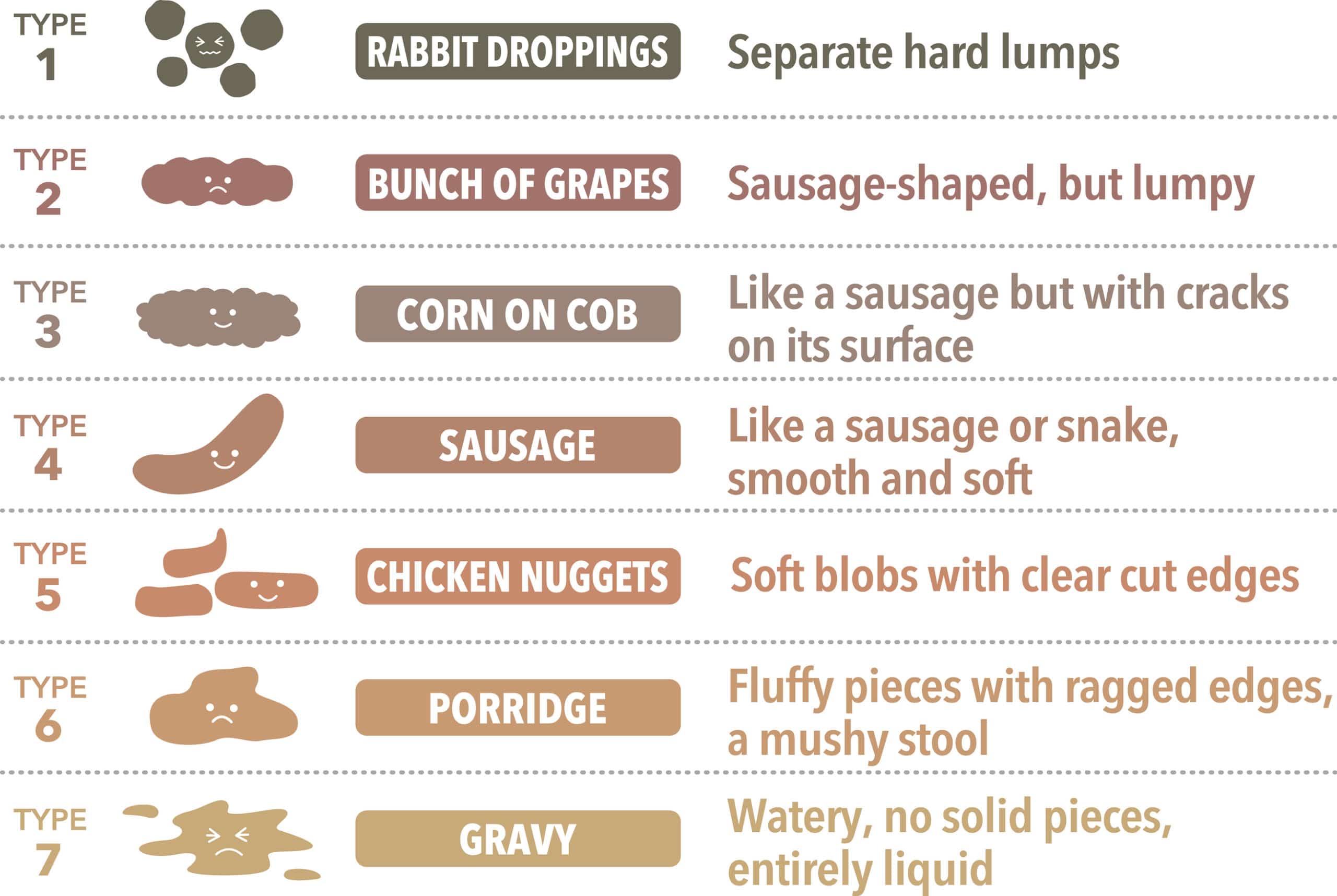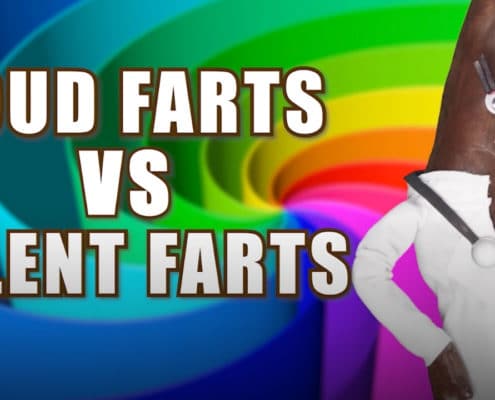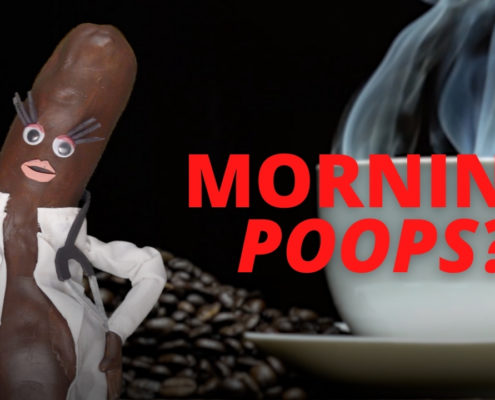How Often Should You Fart?
How Often Should You Fart?
(How Often Should You Fart and Are You Farting Enough? What About Too Much?)
Click Here For Transcript of "How often should you fart?" Video
Farts aren’t always funny… especially when they happen too often or uncontrollably…so how many is too many?
How often “should” you fart?
There’s no simple answer but whether it’s inhabitable planets or fart frequency, there is a Goldilocks Zone.
Let me explain.
Farting is totally normal.
We’re designed to do it about 5-15 times a day.
Some foods like beans or raw vegetables can lead to a lot more and that’s not necessarily bad.
What is bad is missing out on the one “stinky” nutrient that I’ve found that keeps me farting “just riiight.”
Click the link below and until then, if you’re home alone let your fart flag fly.
Until next time, like for good poop, share for great poop.
Have you ever wondered if there’s such a thing as farting too much or too little? Whether it’s a chuckle-inducing topic at the dinner table or a silent but deadly issue on a first date, the frequency of passing gas can actually tell you a lot about your body’s health.
First things first, farting is a natural part of digestion. It’s the byproduct of a bustling ecosystem in your gut working hard to break down food. However, the ” normal ” range can vary widely among individuals, influenced by diet, lifestyle, and overall gut health.
So, if you wonder whether your gas levels are a sign of something serious or if you’re just a bit more “musical” than others, stay tuned. Understanding the nuances of what’s normal and what’s not can help demystify this bubbly aspect of human biology and can keep you both laughing and learning.
And, if this peek into the airy subject of farts has piqued your curiosity, remember to share this snippet with friends and family. Who knows? Your next social gathering might just become a lively discussion about the symphony in everyone’s stomachs.
Unveiling the Norms: How Many Times Should You Fart a Day?
While the frequency of farting might be a hot topic around the coffee table, getting down to the actual numbers can be pretty enlightening. On average, most people fart anywhere between 5 to 15 times a day. Yes, that’s right. Even during your 8-hour workday or a quiet evening at home, your body could be quietly composing its own little symphony.
Now, what’s considered normal can swing quite a bit depending on your digestion, diet, and the bacteria in your gut. Some might find that a plate of beans or dairy can turn them into more prolific gas composers, while for others, it’s just another meal. If you notice you’re producing more gas than the upper end of the normal range, it might be time to look at what you’re eating or discuss your symptoms with a healthcare provider.
Why, you might ask, is farting healthy? Well, think of it as your body’s way of releasing excess air and byproducts from digestion. Not only does this keep you comfortable, but it also helps maintain a healthy balance in your gut. Regularly passing gas is a sign that your digestive system is working as it should, breaking down food and extracting nutrients with the help of those beneficial gut bacteria.
Remember, everyone’s body has unique quirks, including how it handles the byproducts of digestion. Embracing your body’s natural functions is key to understanding and maintaining your health. So, the next time you pass gas, perhaps give a silent nod of thanks to your body for doing its job well.
Curious about more digestive health tips and facts? Don’t forget to share this knowledge with your peers—everyone can benefit from some enlightenment on their internal processes.
Exploring the Causes of Digestive Gas
Digestive gas is a universal human experience, often eliciting giggles or embarrassment. However, understanding what contributes to gas can provide not only peace of mind but also clues on how to manage it. Several factors influence gas production, from what you eat to how you eat it.
Here’s a closer look at some common causes of digestive gas.
1. High-Fiber Foods
Certain foods, such as beans, broccoli, onions, and whole grains, are just a few high-fiber champions known to cause gas. Fiber is essential for gut health, but it can also be fermented by gut bacteria, producing gas as a natural byproduct.
Gradually increasing fiber intake and drinking plenty of water can help minimize discomfort.
2. Dairy Products
For individuals with lactose intolerance, dairy products can lead to excessive gas. This occurs because they lack the enzyme lactase, which is necessary to break down lactose, the sugar found in milk and other dairy products.
Substituting with lactose-free options or taking lactase supplements can alleviate the problem.
3. Carbonated Beverages
Drinking soda and other fizzy drinks introduces carbon dioxide into the digestive system, which can become trapped and cause bloating and belching.
Opting for still water or non-carbonated drinks can significantly reduce gas.
4. Eating Habits
How you eat can be just as important as what you eat. Eating quickly, talking while eating, and chewing gum can make you swallow excess air, which increases gas production.
Taking time to eat slowly and mindfully can help reduce the amount of air swallowed.
5. Artificial Sweeteners
Sorbitol and xylitol, found in sugar-free gum and candies, can cause significant gas in some people. These sugar alcohols are not fully absorbed by the body and are fermented by bacteria in the gut.
Reading food labels and avoiding products containing these sweeteners can help control gas.
6. High-Fat Foods
Though not as gas-producing as other causes, fatty foods can slow down digestion, potentially leading to a gas buildup.
Moderating the intake of high-fat foods can keep digestion running more smoothly.
Understanding these triggers is the first step toward managing and minimizing their impact on daily comfort. While some gas is normal during digestion, persistent issues may warrant a closer look at your diet or a conversation with your healthcare provider.
Medications That May Cause Excess Gas
While medications are essential for managing health conditions, they can sometimes lead to side effects such as excessive flatulence. Understanding which drugs can cause this side effect might help you manage or mitigate it effectively.
Here’s a look at some common medications that contribute to excess gas.
1. Antibiotics
While antibiotics are crucial for fighting bacterial infections, they can disrupt the natural balance of bacteria in the gut. This disruption often leads to an increase in gas production as the balance of gut flora shifts.
Discussing probiotic options with a healthcare provider might be beneficial if symptoms are bothersome.
2. Metformin
Commonly prescribed for type 2 diabetes, Metformin can cause gastrointestinal side effects, including gas. These effects occur as the body adjusts to the medication and are usually temporary.
Eating a mild, balanced diet during the initial weeks of treatment can help lessen these symptoms.
3. Laxatives
Laxatives can increase gas production to relieve constipation as they stimulate bowel movements. Particularly, osmotic laxatives, which draw water into the intestines, can cause fermentation and, subsequently, gas.
It’s advisable to use them under medical guidance and only as necessary.
4. NSAIDs
Nonsteroidal anti-inflammatory drugs like ibuprofen and aspirin can cause gastric irritation and increased gas when taken regularly. These medications can affect the stomach lining and change how the gut processes and passes food.
Taking these medications with food and limiting their use can help manage gas production.
5. Cholesterol-lowering drugs
Some statins and other lipid-lowering medications can cause digestive issues, including increased gas. This side effect can result from the medication’s impact on how the body digests fats.
Discussing alternative cholesterol management strategies with your healthcare provider may be necessary if this becomes problematic.
Being aware of these potential side effects allows for better management strategies, such as dietary adjustments, timing of medication intake, or possibly switching medications under your doctor’s guidance.
If excess gas persists, it may be helpful to review your medications and overall health strategy with your healthcare provider.
Health Conditions Linked to Excessive Gas and Farting
Experiencing excessive gas and farting can sometimes be more than just a result of dietary choices or habits; it may also indicate an underlying health condition. Recognizing these conditions can help you seek appropriate treatment and manage symptoms more effectively.
Here are several medical conditions that are commonly associated with increased gas production.
1. Irritable Bowel Syndrome (IBS)
IBS is one of the most common digestive disorders known to produce excess gas. Affecting the large intestine, IBS leads to symptoms like bloating, gas, abdominal (stomach) pain, and changes in bowel habits. The exact cause of IBS isn’t well understood, but it is associated with a disruption in the gut-brain axis.
Managing IBS often requires dietary changes, stress management, and sometimes medication to relieve symptoms and regulate digestion.
2. Lactose Intolerance
This condition, one of the most common food intolerances, stems from the body’s inability to digest lactose, the sugar found in milk and dairy products, due to a deficiency in the enzyme lactase. When lactose is not digested correctly, it is fermented by bacteria in the colon, producing excess gas.
Avoiding lactose-containing foods or using lactase supplements can help manage these symptoms.
3. Celiac Disease
Celiac disease is an autoimmune disorder in which ingesting gluten damages the small intestine. This damage can hinder the absorption of various nutrients and cause digestive symptoms such as gas, bloating, and diarrhea.
A strict gluten-free diet is essential for managing celiac disease and alleviating gastrointestinal symptoms.
4. Gastroesophageal Reflux Disease (GERD)
GERD is one of the most common digestive and kidney diseases. It is characterized by frequent acid reflux, where stomach acid flows back into the esophagus. This condition can also cause belching and increased gas as side effects.
Lifestyle modifications, such as elevating the head during sleep, eating smaller meals, and avoiding specific trigger foods, are often recommended alongside medications.
5. Small Intestinal Bacterial Overgrowth (SIBO)
SIBO occurs when the number of bacteria in the small intestine increases abnormally. This excessive bacterial growth can lead to excessive gas buildup, resulting in bloating, intestinal gas, diarrhea, and abdominal pain.
Treatment typically involves antibiotics and dietary adjustments to reduce symptoms and restore the balance of gut bacteria.
Understanding these conditions can be crucial for those dealing with persistent issues with gas. If symptoms are severe or ongoing, consulting with a healthcare provider for proper diagnosis and treatment is recommended. This approach ensures both symptom relief and health optimization.
Natural Strategies to Reduce or Prevent Excess Gas
Excess gas can be uncomfortable and sometimes embarrassing, but there are several natural ways to manage or even prevent it from becoming a frequent concern. Adopting specific dietary habits and lifestyle changes can significantly improve your digestive health and reduce instances of gas.
Here are some effective natural methods to consider if you’re looking to keep gas at bay.
1. Increase Fiber Gradually
While a high-fiber diet benefits the digestive system, adding too much fiber too quickly can lead to gas. Gradually increase your intake of fiber-rich foods such as fruits and vegetables to prevent this.
This allows your digestive system to adjust without overwhelming it, thereby minimizing gas production.
2. Stay Hydrated
Drinking adequate fluids helps facilitate digestion and reduces the chances of constipation, which can often exacerbate gas. Water is particularly effective, but other fluids like herbal teas can also contribute to better hydration and digestion.
Avoid carbonated beverages, which can introduce extra gas into your digestive system.
3. Practice Mindful Eating
Eating foods too quickly often leads to swallowing excess air, which can increase gas production. Take your time with meals, chew food slowly and thoroughly, and consider putting your fork down between bites to ensure you eat slower. This helps ensure that you do not swallow air.
Mindful eating not only helps reduce gas but also enhances digestion and nutrient absorption.
4. Exercise Regularly
Physical activity helps stimulate intestinal transit, which can help prevent gas and bloating. Even a simple daily walk can significantly affect how your body processes food and eliminates gas.
Consistent exercise is key to maintaining a healthy digestive system.
5. Avoid Gas-Producing Foods
Some foods are known to produce more gas than others. Common culprits include beans, onions, broccoli, cabbage, and cauliflower.
If you notice particular foods trigger your gas, consider reducing your intake or preparing them differently to minimize their effects.
6. Consider Herbal Remedies
Certain herbs, such as peppermint, ginger, and chamomile, are known for their digestive benefits and can help alleviate gas. Peppermint tea, for example, can relax the gastrointestinal tract muscles and facilitate easier gas passage.
Incorporating these herbs into your diet through teas or supplements can be a gentle and natural way to reduce gas.
By integrating these natural strategies into your daily routine, you can see a noticeable decrease in gas and an overall improvement in your digestive health. Remember, each body is unique, so it might take some experimentation to discover which methods work best for you.
When to Consult a Doctor About Excess Gas
While occasional excess gas is usually not a cause for concern, it can sometimes be a symptom of a more serious underlying medical condition. Knowing when to seek medical advice can help you address potential health issues before they become more significant.
Here are some guidelines on when it might be time to consult a doctor about your gas symptoms.
- Persistent Symptoms: If you experience frequent gas over several weeks despite making dietary changes and trying natural remedies, it may be time to see a doctor. Persistent or worsening symptoms can indicate digestive conditions such as irritable bowel syndrome (IBS), lactose intolerance, or small intestinal bacterial overgrowth (SIBO).
- Pain and Discomfort: Gas accompanied by severe, recurrent pain or discomfort, especially if localized in a specific area, could signal blockages or other problems in the digestive tract. Pain that disrupts your daily activities should not be ignored.
- Additional Symptoms: If your gas is accompanied by other troubling symptoms, such as weight loss, diarrhea, constipation, blood in the stool, or vomiting, these could be signs of a more serious condition like celiac disease or inflammatory bowel disease. These symptoms warrant a thorough evaluation by a healthcare provider.
- Odor Changes: While it’s normal for gas to have an odor, a significant change in the smell of your gas—especially if it becomes foul—could indicate digestive issues requiring medical attention.
- Response to Medications: If you suspect that your excess gas is caused by or exacerbated by new medications, discuss this with your healthcare provider. Adjusting the medication or dosage might alleviate the problem.
Recognizing these signs and seeking timely medical advice can ensure that severe conditions are diagnosed and managed early, improving overall health and quality of life. Your doctor can offer specific guidance tailored to your health needs and help you get back to feeling your best.
FAQ: Understanding Lower Colon Health
1. What is the function of the lower colon?
The lower colon, primarily consisting of the descending and sigmoid colon, plays a crucial role in the final stages of digestion. Its main function is to absorb water and salts from the material that hasn’t been digested as food passes through. This process helps solidify waste into stool.
The lower colon also serves as storage for stool before it is expelled from the body during a bowel movement, making its health vital for regularity and comfort.
2. What are the common signs of lower colon health issues?
Common signs of issues with the lower colon include irregular bowel movements, such as constipation or diarrhea, abdominal pain, bloating, and blood in the stool. Persistent changes in the consistency or frequency of stool can also indicate lower colon problems.
If these symptoms are accompanied by unexplained weight loss or fatigue, it’s advisable to consult a healthcare provider.
3. How can diet affect the health of the lower colon?
Diet plays a significant role in maintaining the health of the lower colon. High-fiber foods, such as vegetables and fruits help create bulk and soften stool, which aids in smoother transit through the colon.
Conversely, a diet high in processed foods and low in fiber can lead to constipation, which strains the lower colon. Additionally, staying hydrated is crucial, as water works with fiber to keep stool soft and manageable.
4. Are there preventive measures to maintain lower colon health?
Preventive measures for maintaining lower colon health include a balanced, fiber-rich diet, adequate hydration, regular exercise, and routine health screenings. Based on personal or family health history, screenings such as colonoscopies are recommended for adults starting at age 45 or earlier.
These screenings are vital as they can detect early signs of colon disorders, including colon cancer, before symptoms become apparent.
5. What are effective treatments for common lower colon issues?
Treatment for common lower colon issues typically depends on the specific condition diagnosed. For general problems like constipation, increasing fiber intake, exercising, and drinking more water can be effective. Over-the-counter laxatives may help but should be used cautiously and under a doctor’s guidance.
For more severe conditions, like inflammatory bowel disease or colon cancer, treatment might include medication, lifestyle adjustments, or surgery. Personalized medical advice is essential for effective management and treatment of these conditions.
Maintaining the health of your lower colon is integral to overall digestive wellness. Simple lifestyle changes can profoundly impact colon function and help prevent more serious digestive issues.
Conclusion: Embracing the Natural Symphony
Farting, a natural digestive process, varies from person to person, typically occurring 5 to 15 times a day. While it may sometimes cause discomfort or embarrassment, understanding its frequency and triggers helps us manage it better. Remember, if your experiences consistently fall outside the normal range, it could be wise to consult a healthcare provider.
Enjoyed learning about this bubbly aspect of health? Share this enlightening piece with friends and family across all social media platforms and via email—everyone appreciates a burst of knowledge that could make daily life more comfortable.
Take Viscera-3!
You can help fix so many of your digestive and bathroom issues, such as gas buildup and bloating, and improve your overall health with this patented molecule that is backed by Ivy League Doctors by clicking here! What do you have to lose except all those painful and embarrassing gaseous explosions?!!!
Types of poop encountered are categorized by the Bristol Stool Chart. This chart is a generalized indicator of how or why different types of poops look and feel a certain way. The 7 types of poop are broken up into categories based on a 2,000-person study!

Does your poo look this good? If you have Bristol Type 3 or 4 – your poop is considered “normal”! Bristol Type 1 or 2, where the poop is hard and difficult to pass, is indicative of constipation. Often, these types of stool can be painful to pass – but don’t worry – Doctor Poo has a recommended healthy-gut switch solution…just keep reading!
Should you ever worry about your poop?
Always consult your healthcare provider if you have any concerns about what your poop means. People are asked to call their healthcare providers if: They experience severe levels of abdominal pain or discomfort with diarrhea that does not go away when they poop or fart. Also, if diarrhea is accompanied by a fever of 101 degrees Fahrenheit or higher, chills, vomiting, or fainting, call your physician immediately.
What is unhealthy poop?
An unhealthy poop is when one poops too often (hence, your doctor asking you if you poop more than three times daily) or not poops often enough (As such, less than three times a week) and also excessive straining when pooping. Poop that is colored red, black, green, yellow, or white. greasy or fatty stools are unhealthy.
Help fix so many of your digestive and bathroom issues, such as gas and bloating, and improve your overall health with this patented molecule that is backed by Ivy League doctors clicking here!
Doctor Poo Provides More Valuable Answers for Those Hard-to-Ask Questions Below:













Trackbacks & Pingbacks
[…] post Poo Doctor Why do farts smell bad Discolored Poop Why do farts make noise Why does coffee make you p… How Often Should You Fart? appeared first on SANESolution | Proven & Powerful […]
Comments are closed.